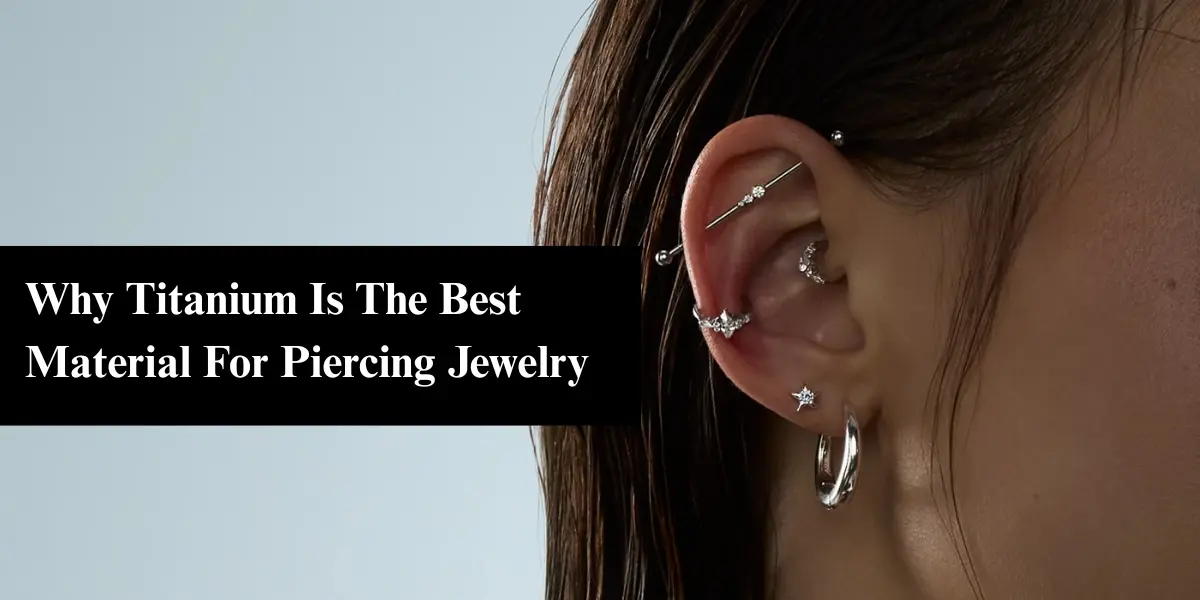When selecting jewelry for body piercings, especially for initial piercings, the materials are critical. The best available material today is titanium. Below are the key points about why professional piercers, dermatologists, and individuals with sensitive skin seem to be partial to titanium.
1. Biocompatibility & Hypoallergenic Qualities
-
- Low risk of allergy: Titanium has an extremely high level of biocompatibility. It does not contain any nickel (or low levels)—nickel being one of the most common allergens associated with metal. There is an extremely small chance, if ever, that allergic reactions like itching, rash, or discoloration will occur.
-
- Medical-grade qualities: The titanium used for well-designed quality piercing jewelry is that which was originally developed for long-term contact with human tissue, referred to as “implant-grade.” The alloy is Ti-6Al-4V-ELI (commonly known as Grade 23 or in accordance with ASTM F-136 / ISO 5832-3 titanium). Titanium has the highest level of chemical and physical property requirements.
2. Corrosion Resistant & Durable
-
- Corrosion-resistant: Titanium has a protective layer of oxide that develops and is self-protecting against further oxidation or earth. For general purposes, sweat, bodily fluids, moisture, and even salt water (occasionally) will not have any negative impact on quality titanium.
-
- Long-lasting wear: It is stronger than its weight and will not deform, bend, or wear out after repeated use caused by everyday stress. Because the material is inert, there is minimal chemical degradation over time.
3. Light Weight & Comfort
-
- Titanium is much lighter than many of the other metals used for jewelry (surgical steel, silver). This reduces physical stress on the site of the piercing and makes it comfortable, especially in delicate or more mobile body parts such as the ear, nose, cartilage, tongue, etc.
-
- The lightweight attribute also benefits the healing process because it causes less pulling or irritation of the hole while it is healing.
4. Healing & Reduced Complications
-
- Heal faster and cleaner: Due to its inertness and hypoallergenic properties, titanium jewelry is not likely to cause inflammation, infection, or irritation, which causes healing to be better and less complicated compared to other metal jewelry.
-
- Good for fresh piercings: Lots of piercers recommend titanium jewelry for new piercings because of its safety and minimal tissue irritation.
5. Aesthetic flexibility
-
- Anodizing & color: Titanium can be anodized for color without painting or coating and does not degrade or flake. The pigment is a result of the impact of the thickness of the oxide layer, which is rather stable.
-
- Polish and finish: Titanium, particularly osteopathic grade, can be polished for a high smooth shine. Smooth will minimize where bacteria can hide and minimize where irritation can start.
6. Safety in Medical Contexts & Standards Compliance
-
- The use of implant-grade titanium alloys, particularly ASTM F-136, ISO 5832-3, etc., is utilized with medical implants (bones, dental implants, etc.), which speaks to long-term performance and, moreover, safety within very aggressive and biologically harsh internal environments.
-
- Non-magnetic: Many titanium alloys are non-magnetic. This is helpful if any medical imaging (e.g., MRI, etc.) is performed because jewelry must be removed, and it is always an inconvenience.
7. Concerns/Limitations
While titanium is very good stuff, there are a few things to consider.
-
- Grade and Authenticity: Not all “titanium” jewelry is implant-grade titanium (or even true titanium). Some cheap alloys or poorly manufactured items have impurities, rough finishes, or are just not ASTM/ISO grades. Always read labeling, and if possible, buy from a reputable piercer to know the titanium is implant grade.
-
- Cost: As a whole, titanium pieces are usually more expensive (often significantly so) than basic surgical steel or other non-standard metal jewelry, largely because of material and manufacturing costs. A lot of individuals would contend, however, that the safety and durability of titanium are worth the cost.
-
- Finish: Anodized titanium colors are more stable than painted coatings. However, similarly to other finished metals, under heavy wear and tear, the anodized finish may eventually dull the oxide layer or scratch the surface. Proper care helps.
To conclude, people prefer titanium for their piercings because it has an excellent combination of safety, comfort, durability, and appearance. For all new piercings, skin that is reactive and/or for body jewelry that will stay for years on end, titanium (especially implant grade) is almost always the better choice.
